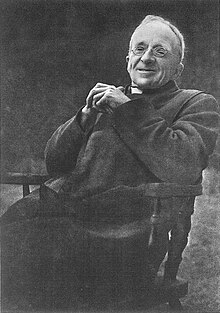Joseph Rickaby

Joseph John Rickaby (1845-1932) was an English Jesuit priest and philosopher.
Life
He was born in 1845 in Everingham, York. He received his education at Stonyhurst College, and was ordained in 1877, one of the so-called Stonyhurst Philosophers, along with Richard F. Clarke, Herbert Lucas, and his own brother, John Rickaby.[1] a significant group for neo-scholasticism in England.[2] At the time he was at St Beuno's, he was on friendly terms with Gerard Manley Hopkins;[3] they were ordained on the same day.
He was affiliated with Clarke's Hall in Worcester College, Oxford. He would deliver conferences to Catholic undergraduates of Oxford and Cambridge.[4][5] His work is quoted by Charles E. Raven in Science, Religion, and The Future (1943, p. 9).
Works
- Aquinas Ethicus, a translation of the principal portions of the Second Part of the Summa Theologica, in two volumes: Volume 1 and Volume 2 (1892)
- The First Principles of Knowledge (1888)
- Notes on St. Paul: Corinthians, Galatians, Romans (1898)
- Oxford & Cambridge Conferences 1897-1899 (1899)
- Political and Moral Essays (1902)
- Free Will and Four English Philosophers: Hobbes, Locke, Hume and Mill (1906)
- The Divinity of Christ a lecture(1906)
- Scholasticism (1908)
- Four-Square: or, The Cardinal Virtues (1908)
- Newman Memorial Sermon (1910)
- An Index to the Works of John Henry Cardinal Newman (1914)
- Moral Philosophy: Ethics, Deontology and Natural Law (1918)
- Practice of Perfection and Christian Virtues, a translation from the original Spanish of Alphonsus (Alonso) Rodriguez's Ejercicio de Perfección y Virtudes Cristianas, complete in two volumes (1929).
- Of God and His Creatures (annotated, abridged translation of the Summa Contra Gentiles), by Saint Thomas Aquinas
References
- ^ Jill Muller, Gerard Manley Hopkins and Victorian Catholicism: A Heart in Hiding (2003), p. 89
- ^ "CATHOLIC ENCYCLOPEDIA: Neo-Scholasticism". www.newadvent.org.
- ^ Joseph J. Feeney, The Playfulness of Gerard Manley Hopkins (2008), p. 18.
- ^ Francis Cowley Burnand, The Catholic Who's who and Yearbook, Burns & Oates, 1908.
- ^ "Free will and four English philosophers : Hobbes, Locke, Hume and Mill /". worldcat.org.
External links
- Works by Joseph Rickaby at Project Gutenberg
- Works by or about Joseph Rickaby at Internet Archive
- Online books page
